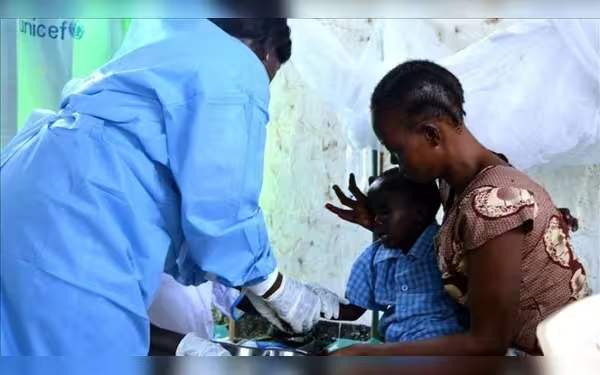Saturday, November 16, 2024 08:25 PM
Cholera Outbreak in Sudan Claims 433 Lives
- Cholera outbreak death toll reaches 433 in Sudan.
- Over 13,900 confirmed infections reported by Health Ministry.
- Civil war exacerbates public health crisis in Sudan.
 Image Credits: nation_pk
Image Credits: nation_pkThe cholera outbreak in Sudan has claimed 433 lives, with over 13,900 infections reported amid severe flooding and civil unrest.
The ongoing cholera outbreak in Sudan has reached alarming levels, with the death toll now standing at 433. This tragic situation has unfolded against a backdrop of severe flooding and heavy rainfall that began in June, creating conditions ripe for the spread of this deadly disease. The Health Ministry of Sudan has reported a total of 13,922 confirmed infections, highlighting the urgent need for effective public health measures.
Cholera is an infectious disease that can cause severe diarrhea and dehydration, often leading to death if not treated promptly. The Sudanese authorities declared cholera an epidemic on August 12, recognizing the critical nature of the situation. Unfortunately, the country is also grappling with a devastating civil war, which has further strained its already fragile health system. Hospitals and clinics are struggling to function, making it increasingly difficult for those affected by cholera to receive the care they desperately need.
The combination of civil unrest and a public health crisis has created a perfect storm for the people of Sudan. Many families are facing not only the threat of cholera but also the challenges of displacement and lack of access to clean water and sanitation facilities. These factors contribute to the rapid spread of the disease, as contaminated water sources become more common in the wake of flooding.
As the situation continues to evolve, it is crucial for the international community to pay attention to Sudan's plight. Humanitarian aid and support are essential to help combat the cholera outbreak and provide relief to those suffering from its effects. The need for clean water, medical supplies, and healthcare professionals is more pressing than ever.
The cholera outbreak in Sudan serves as a stark reminder of the interconnectedness of health, environment, and conflict. It is a call to action for governments and organizations worldwide to come together and provide the necessary support to those in need. By addressing the root causes of such outbreaks and ensuring access to basic health services, we can help prevent future tragedies and save lives.













